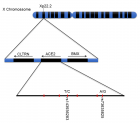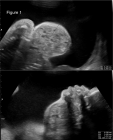Abstract
Research Article
Profile of vitamin D receptor polymorphism Bsm I and FokI in end stage renal disease Egyptian patients on maintenance hemodialysis
EL-Attar HA*, Mokhtar MM and Gaber EW
Published: 30 August, 2017 | Volume 1 - Issue 1 | Pages: 026-040
Objective: In end stage renal disease, the synthesis of vitamin D is disturbed.Hyperparathyroidism is one of the key factors in the pathogenesis of many of the complications of dialysis mainly bone and cardiovascular complications.Aim:This study aimed at assessing vitamin D receptor gene polymorphisms BsmIand FokI in Egyptian patients with end stage renal disease on maintenance haemodialysis and the assosciation of these polymorphisms with cardiovascular complications and hyperparathyroidism among these patients.
Methods: One hundred subjects, recruited from Medical Research Institute, from March to July 2014, divided into two main groups; the control group which included thirty apparently healthy subjects and the patients group which included seventy patients with end stage renal disease on maintenance haemodialysis with median 4 years. To all studied subjects, detailed history was taken, thorough physical examination, carotid intima media thickness, presence of plaques and ECG ischemic changes. Laboratory investigations included serum levels of: glucouse, urea, creatinine, uric acid, albumin, total cholesterol, low and high density lipoproteins, calcium, phosphorus, and CRP as well as plasma PTH level. For molecular studies, the detection of BsmI and FokI polymorphisms using polymerase chain reaction and restriction fragment length polymorphism (PCR / RFLP) technique.
Results: 1.No statistically significant difference could be detected in both BsmI and FokI gene polymorphisms between the hemodialysis patients and the controls, suggesting that the development of ESRD had no relation with either VDR BsmI or FokI gene polymorphisms.2.No statistically significant difference were found in these polymorphisms between the hemodialysis patients with or without cardiovascular complications or between patients with PTH level less or more than 300 pg/ml. These results suggest that the development of cardiovascular complications and secondary hyperparathyroidism among Egyptian patients on maintenance haemodialysis cannot be attributed to these two gene polymorphisms.
Conclusion: No association could be found between the variant alleles of BsmI and FokI gene polymorphisms and the development of ESRD, cardiovascular complications and secondary hyperparathyroidism among the studied samples of Egyptian patients on maintenance haemodialysis.
Read Full Article HTML DOI: 10.29328/journal.jcn.1001005 Cite this Article Read Full Article PDF
Keywords:
Chronic renal failure; End stage renal disease (ESRD); Hemodialysis; Gene polymorphism; Vitamin D receptor polymorphism; Vdr; Bsmi; Foki
References
- Tang J. Vitamin D and its role in chronic kidney disease. Nephrology Rounds. 2009; 7: 1-6.
- Feldman D, Pike JW, Adams JS. Vitamin D, 3rd Ed. Academic Press Elsevier, Amsterdam. 2011; 1245-90.
- Hollick MF. Vitamin D deficiency. N Engl J Med. 2007; 357: 266-2681. Ref.: https://goo.gl/6ioGRP
- Grzegorzewska AE, Świderska MK, Mostowska A, Warchoł W, Jagodziński PP. Polymorphisms of vitamin D receptorsignaling pathway genes and calcium-sensing receptor gene in respect to survival of hemodialysis patients: A prospective observational study. Int J Endocrinol. 2016; 2383216: 11. Ref.: https://goo.gl/Vm7YAc
- Kato S. The function of vitamin D receptor in vitamin D action. J Biochem. 2000; 127: 717-722. Ref.: https://goo.gl/2UKFNz
- Thorne J, Campbell MJ. The vitamin D receptor in cancer. Proc Nutr Soc. 2008; 67: 115-127. Ref.: https://goo.gl/PNpRJL
- Holick MF. Sunlight and vitamin D for bone health and prevention of autoimmune diseases, cancers, and cardiovascular disease. Am J Clin Nutr. 2004; 80: 1678-1688. Ref.: https://goo.gl/MDQHxA
- Germain P, Staels B, Dacquet C, Spedding M, Laudet V. Overview of nomenclature of nuclear receptors. Pharmacol Rev. 2006; 58: 685-704. Ref.: https://goo.gl/jQsXra
- Genetics home reference. http://ghr.nlm.nih.gov/gene/VDR.
- Bouillon R, Carmeliet G, Verlinden L, Van Etten E, Verstuyf A, et al. Vitamin D and Human Health: Lessons from vitamin D receptornull mice. Endocr Rev. 2008; 29: 726-776. Ref.: https://goo.gl/mZMxYS
- Valdivielso JM, Fernandez E. Vitamin D receptor polymorphism and disease. Clin Chim Acta. 2006; 371: 1-12. Ref.: https://goo.gl/4Tvt1s
- Barreiro LB, Laval G, Quach H, Patin E, Quintana-Murci L. Natural selection has driven population differentiation in modern humans. Nat Genet. 2008; 40: 340-345. Ref.: https://goo.gl/6V16kH
- Bid HK, Mittal RD. Study of vitamin-D receptor (VDR) gene start codon polymorphism (Fok I) in healthy individuals from North India. Indian J Hum Genet. 2003; 9: 51-4.
- Li WH, Gu Z, Wang H, Nekrutenko A. Evolutionary analyses of the human genome. Nature 2001; 409: 847-849. Ref.: https://goo.gl/jE2BEY
- Uitterlinden AG, Fang Y, van Meurs JB, Pols HA, Van Leeuwen JP. Genetics and biology of vitamin D receptor polymorphisms. Gene. 2004; 338: 143-156. Ref.: https://goo.gl/mtd2hs
- Zmuda JM, Cauley JA, Ferrell RE. Molecular epidemiology of vitamin D receptor gene variants. Epidemiol Rev. 2000; 22: 203-217. Ref.: https://goo.gl/nRPwNd
- http://www.snpedia.com/index.php/Rs1544410
- Whitfield GK, Remus LS, Jurutka PW, Zitzer H, Oza AK, et al. Functionally relevant polymorphisms in the human nuclear vitamin Dreceptor gene. Mol Cell Endocrinol. 2001; 177: 145-1459. Ref.: https://goo.gl/VdS6vT
- http://www.snpedia.com/index.php/Rs2228570
- Mosos I, Marginean O. Links between vitamin Ddeficiency and cardiovascular diseases. Biomed Res Int. 2015; 109275: 12. Ref.: https://goo.gl/9puMuk
- Nigwekar SU, Tamez H, Thadhani RI. Vitamin D and chronic kidney disease-mineral bone disease (CKD-MBD). Bonekey Rep. 2014; 3: 498. Ref.: https://goo.gl/853Fi
- Tomasello S. Secondary hyperparathyroidism and chronic kidney disease. Diabetes Spectrum 2008; 21: 19-25.
- Santoro D, Lucisano S, Gagliostro G, Alibrandi A, Benvenga S, et al. Vitamin D receptor polymorphism in chronic kidney disease patients with complicated cardiovascular disease. J Ren Nutr. 2015; 25: 187-193. Ref.: https://goo.gl/JDdtPo
- Fernandez Fernández E, Fibla J, Betriu A, Piulats JM, Almirall J, et al. Association between vitamin D receptor gene polymorphism and relative hypoparathyroidism in patients with chronic renal failure. J Am Soc Nephrol. 1997; 8: 1546-1552. Ref.: https://goo.gl/LGJ3XU
- Vigo GE, Cadarso-Suarez C, Perez-Fernandez R, Romero BR, Devesa MJ, et al. Association between vitamin D receptor FokI Polymorphism and serum parathyroid hormone level in patients with chronic renal failure. J Endocrinol Invest. 2005; 28: 117-121. Ref.: https://goo.gl/nSpKAD
- Yildiz A, Tepe S, Olfaz H, Yazici H, Ark E, et al. Carotid atherosclerosis is a predictor of coronary calcification in chronic hemodialysis patients. Nephrol Dial Transplant. 2004; 19: 885-891. Ref.: https://goo.gl/cQV5ic
- Ruiz MR, Cajavilca C, Varon J. Einthoven's string galvanometer the first electrocardiograph. Tex Heart Inst J. 2008; 35: 174-178. Ref.: https://goo.gl/QpEFcC
- Burtis CA, Ashwood ER, Bruns DE. Tietz Text Book of Clinical Chemistry and Molecular Diagnostics. 4th Ed. Elsevier Saunders Company, St Louis. 2006; 1689-1699.
- Gunes S, Sumer AP, Keles GC, Kara N, Koprulu H, et al. Analysis of vitamin D receptor gene polymorphisms in patients with chronic periodontitis. Indian J Med Res. 2008; 127: 58-64. Ref.: https://goo.gl/RUuhpf
- Mansour L, Sedky M, AbdelKhader M, Sabry R, Kamal M, et al. The role of vitamin D receptor genes (FOKI and BSMI) polymorphism in osteoporosis. Middle East Fertil Soc J. 2010; 15: 79-83.
- Daly LE, Bourke GJ. Interpretation and uses of medical statistics. 5th Ed. Blackwell Science, Oxford, Malden. 2000.
- Puri BK. SPSS in practice: an illustrated guide. 2nd Ed. Arnold, London, New York. 2002.
- Andress DL. Vitamin D in chronic kidney disease: a systemic role for selective vitamin D receptor activation. Kidney Int. 2006; 65: 33-43. Ref.: https://goo.gl/qJpaVV
- Kumar P, Clark M. Kumar and Clark's Clinical Medicine. 7th Ed. Elsevier Saunders Company, Edinburgh, 2009; 628.
- Ozdemir FN, Sezer S, Atac B, Tutal E, Verdi H, et al. Vitamin D receptor BsmI and TagI gene polymorphisms in a Turkish ESRD population: influences on parathyroid hormone response. Transplant Proc. 2005; 37: 2922-2924. Ref.: https://goo.gl/JPJepx
- El Gawad SS, Samea ER, Sherif M, Elrakhawy MM. Vitamin D receptor genotypes, bone mineral density and biochemical markers of bone turnover in Egyptian premenopausal women with graves ' disease. New York Science Journal. 2012; 5: 54-61.
- Mostowska A, Lianeri M, Wudarski W, Olesińska M, Jagodziński PP. Vitamin D receptor gene BsmI, FokI, ApaI and TaqI polymorphisms and the risk of systemic lupus erythematosus. Mol Biol Rep. 2013; 40: 803-810. Ref.: https://goo.gl/EQBP9w
- Paul J, Dasgupta S, Ghosh MK. Carotid artery intima media thickness as a surrogate marker of atherosclerosis in patient with chronic renal failure on hemodialysis. N Am J Med Sci. 2012; 4: 77-80. Ref.: https://goo.gl/xBx8HS
- Rahman M, Smith MC. Hypertension in hemodialysis patients. Curr Hypertens Rep. 2001; 3: 496-502. Ref.: https://goo.gl/4FHxRf
- Agarwal R, Nissenson AR, Batlle D, Coyne DW, Trout JR, et al. Prevalence, treatment, and control of hypertension in chronic hemodialysis patients in the United States. Am J Med. 2003; 115: 291-297. Ref.: https://goo.gl/BoHgR3
- Agarwal R. Hypertension and survival in chronic hemodialysis patients-past lessons and future opportunities. Kidney Int. 2005; 67: 1-13. Ref.: https://goo.gl/ZoNdVG
- Stidley CA, Hunt WC, Tentori F, Schmidt D, Rohrscheib M, et al. Changing relationship of blood pressure with mortality over time among hemodialysis patients. J Am Soc Nephrol 2006; 17: 513-20. Ref.: https://goo.gl/ADveVN
- Pan XM, Li DR, Yang L, Wang EY, Chen TY, et al. No association between vitamin D receptor polymorphisms and coronary artery disease in a Chinese population. DNA Cell Biol 2009; 28: 521-525. Ref.: https://goo.gl/AE6sKT
- Ortlepp JR, Von Korff A, Hanrath P, Zerres K, Hoffmann R. Vitamin D receptor gene polymorphism BsmI is not associated with the prevalence and severity of CAD in a large-scale angiographic cohort of 3441 patients. Eur J Clin Invest. 2003; 33: 106-109. Ref.: https://goo.gl/EdWStv
- Yokoyama K, Nakashima A, Urashima M, Suga H, Mimura T, et al. Interactions between serum vitamin D levels and vitamin D receptor gene FokI polymorphisms for renal function in patients with type 2 Diabetes. PLoS One. 2012; 7: 16. Ref.: https://goo.gl/DHrnqj
- Baravkar PN, Bavikar JS, Asegaonkar SB, Bavikar SS, Bardapurkar JS, et al. Study of serum uric acid and C-reactive protein levels in patients with chronic renal disease. Int J Biol Med Res. 2013; 4: 2758-2761.
- Horl WH. The clinical consequences of secondary hyperparathyroidism: focus on clinical outcomes. Nephrol Dial Transplant. 2004; 19: 2-8. Ref.: https://goo.gl/k7FkdF
- Tagliabue J, Farina M, Imbasciati E, Vergani C, Annoni G. BsmI polymorphism of the vitamin D receptor gene in hyperparathyroid or hypoparathyroid dialysis patients. Am J Clin Pathol. 1999; 112: 366-370. Ref.: https://goo.gl/q9eGr3
- Nagaba Y, Heishi M, Tazawa H, Tsukamoto Y, Kobayashi Y. Vitamin D receptor gene polymorphisms affect secondary hyperparathyroidism in hemodialyzed patients. Am J Kidney Dis 1998; 32: 464-469. Ref.: https://goo.gl/eLjFSy
- Carling T, Kindmark A, Hellman P, Lundgren E, Ljunghall S, et al. Vitamin-D-receptor genotypes in primary hyperparathyroidism. Nat Med 1995; 1: 1309-1311. Ref.: https://goo.gl/C83PL2
- Tsukamoto Y, Heishi M, Nagaba Y, Kobayashi N, Nomura Y, et al. More on hyperparathyroidism and the vitamin D receptor. Nat Med. 1996; 2: 1162. Ref.: https://goo.gl/MXmztE
- Valdivielso JM, Fernandez E. Vitamin D receptor polymorphism and disease. Clin Chim Acta. 2006; 371: 1-12. Ref.: https://goo.gl/6nh7yN
- Giannini S, D'Angelo A, Nobile M, Carraro G, Rigotti P, et al. The effects of vitamin D receptor polymorphism on secondary hyperparathyroidism and bone density after renal transplantation. J Bone Miner Res. 2002; 17: 1768-1773. Ref.: https://goo.gl/vjM6Lz
- Falkiewicz K, Bidzinska B, Demissie M, Boratyńska M, Zmonarski SC, et al. Influence of vitamin D receptor gene polymorphisms on secondary hyperparathyroidism and bone density after kidney transplantation. Transplant Proc. 2005; 37: 1023-1025. Ref.: https://goo.gl/TXpce2
- Uitterlinden AG, Fang Y, van Meurs JB, Pols HA, van Leeuwen JP. Genetics and biology of vitamin D receptor polymorphisms. Gene. 2004; 338: 143-1456. Ref.: https://goo.gl/wYBjkt
Figures:

Figure 1

Figure 2
Similar Articles
-
Profile of vitamin D receptor polymorphism Bsm I and FokI in end stage renal disease Egyptian patients on maintenance hemodialysisEL-Attar HA*,Mokhtar MM,Gaber EW. Profile of vitamin D receptor polymorphism Bsm I and FokI in end stage renal disease Egyptian patients on maintenance hemodialysis. . 2017 doi: 10.29328/journal.jcn.1001005; 1: 026-040
-
Anemia response to Methoxy Polyethylene Glycol-Epoetin Beta (Mircera) versus Epoetin Alfa (Eprex) in patients with chronic Kidney disease on HemodialysisAlaa K Dhayef*,Jawad K Manuti,Abdulwahab S Abutabiekh. Anemia response to Methoxy Polyethylene Glycol-Epoetin Beta (Mircera) versus Epoetin Alfa (Eprex) in patients with chronic Kidney disease on Hemodialysis. . 2017 doi: 10.29328/journal.jcn.1001006; 1: 041-047
-
The outcome of Acute Kidney Injury in patients with severe MalariaJoão Egidio Romão Jr*,João Alberto Brandão. The outcome of Acute Kidney Injury in patients with severe Malaria. . 2017 doi: 10.29328/journal.jcn.1001007; 1: 048-054
-
Short term effect of Intravenous Intermittent Iron Infusion versus Bolus Iron Infusion on Iron parameters in Hemodialysis patientsIman Ibrahim Sarhan,Hussein Sayed Hussein,Islam Omar Elshazly*,Mahmoud Salah Hassan. Short term effect of Intravenous Intermittent Iron Infusion versus Bolus Iron Infusion on Iron parameters in Hemodialysis patients. . 2017 doi: 10.29328/journal.jcn.1001008; 1: 055-059
-
Posterior Reversible Leukoencephalopathy Syndrome in a patient after second dose of Rituximab for treatment of resistant Thrombotic Thrombocytopenic PurpuraSabaa Asif*,Sumbal Nasir Mahmood,Osama Kunwer Naveed. Posterior Reversible Leukoencephalopathy Syndrome in a patient after second dose of Rituximab for treatment of resistant Thrombotic Thrombocytopenic Purpura . . 2018 doi: 10.29328/journal.jcn.1001010; 2: 001-004
-
A case report of Hypocomplementemic urticarial vasculitic syndrome presenting with Renal failureAmy M Hopkins,Angela M Gibbs,Ryan S Griffiths,Rupali S Avasare,Firas G Khoury*. A case report of Hypocomplementemic urticarial vasculitic syndrome presenting with Renal failure. . 2018 doi: 10.29328/journal.jcn.1001017; 2: 039-043
-
Relationship between Fetuin-A and vascular or valvular calcification in hemodialysis patientsShahrzad Ossareh*,Bahareh Marghoob,Robabeh Bayat. Relationship between Fetuin-A and vascular or valvular calcification in hemodialysis patients. . 2019 doi: 10.29328/journal.jcn.1001021; 3: 001-011
-
Can bloodstream infection be predicted by nasal culture in hemodialysis patients?Behrooz Broumand*,Shahram Boroumandi,Zahra Rahbar,Mehrdad Sheikhvatan,Maryam Shahroukh. Can bloodstream infection be predicted by nasal culture in hemodialysis patients? . . 2019 doi: 10.29328/journal.jcn.1001030; 3: 076-082
-
Alternate day outpatient hemodialysis schedule is the appropriate practical alternative schedule to improve patients’ outcomesNasrulla Abutaleb*. Alternate day outpatient hemodialysis schedule is the appropriate practical alternative schedule to improve patients’ outcomes. . 2019 doi: 10.29328/journal.jcn.1001034; 3: 107-110
-
Gender and left ventricular structural and functional differences in pulmonary hypertension among end stage renal disease patients on maintenance hemodialysisDaniel B Levin,Umar Malik,Ihab Ajaaj,Jon P Blaschke,Betty Skipper,Sandra L McClelland,Kathleen Fagan,Antonia M Harford,Philip G Zager,Veena Raizada*. Gender and left ventricular structural and functional differences in pulmonary hypertension among end stage renal disease patients on maintenance hemodialysis. . 2019 doi: 10.29328/journal.jcn.1001041; 3: 154-160
Recently Viewed
-
Sinonasal Myxoma Extending into the Orbit in a 4-Year Old: A Case PresentationJulian A Purrinos*, Ramzi Younis. Sinonasal Myxoma Extending into the Orbit in a 4-Year Old: A Case Presentation. Arch Case Rep. 2024: doi: 10.29328/journal.acr.1001099; 8: 075-077
-
Improvement of the Cognitive Abilities in a Chronic Generalized Anxiety Disorder and Moderate Depression Case using a Novel Integrated Approach: The Cognitome ProgramMohita Shrivastava*. Improvement of the Cognitive Abilities in a Chronic Generalized Anxiety Disorder and Moderate Depression Case using a Novel Integrated Approach: The Cognitome Program. J Neurosci Neurol Disord. 2024: doi: 10.29328/journal.jnnd.1001100; 8: 069-089
-
Neuroprotective Effect of 7,8-dihydroxyflavone in a Mouse Model of HIV-Associated Neurocognitive Disorder (HAND)Tapas K Makar, Joseph Bryant, Bosung Shim, Kaspar Keledjian, Harry Davis, Manik Ghosh, Ajay Koirala, Ishani Ghosh, Shreya Makar, Alonso Heredia, Malcolm Lane, J Marc Simard, Robert C Gallo, Volodymyr Gerzanich*, Istvan Merchenthaler*. Neuroprotective Effect of 7,8-dihydroxyflavone in a Mouse Model of HIV-Associated Neurocognitive Disorder (HAND). J Neurosci Neurol Disord. 2024: doi: 10.29328/journal.jnnd.1001101; 8: 090-105
-
Adult Neurogenesis: A Review of Current Perspectives and Implications for Neuroscience ResearchAlex, Gideon S*,Olanrewaju Oluwaseun Oke,Joy Wilberforce Ekokojde,Tolulope Judah Gbayisomore,Martina C. Anene-Ogbe,Farounbi Glory,Joshua Ayodele Yusuf. Adult Neurogenesis: A Review of Current Perspectives and Implications for Neuroscience Research. J Neurosci Neurol Disord. 2024: doi: 10.29328/journal.jnnd.1001102; 8: 106-114
-
Analysis of Psychological and Physiological Responses to Snoezelen Multisensory StimulationLucia Ludvigh Cintulova,Jerzy Rottermund,Zuzana Budayova. Analysis of Psychological and Physiological Responses to Snoezelen Multisensory Stimulation. J Neurosci Neurol Disord. 2024: doi: 10.29328/journal.jnnd.1001103; 8: 115-125
Most Viewed
-
Evaluation of Biostimulants Based on Recovered Protein Hydrolysates from Animal By-products as Plant Growth EnhancersH Pérez-Aguilar*, M Lacruz-Asaro, F Arán-Ais. Evaluation of Biostimulants Based on Recovered Protein Hydrolysates from Animal By-products as Plant Growth Enhancers. J Plant Sci Phytopathol. 2023 doi: 10.29328/journal.jpsp.1001104; 7: 042-047
-
Sinonasal Myxoma Extending into the Orbit in a 4-Year Old: A Case PresentationJulian A Purrinos*, Ramzi Younis. Sinonasal Myxoma Extending into the Orbit in a 4-Year Old: A Case Presentation. Arch Case Rep. 2024 doi: 10.29328/journal.acr.1001099; 8: 075-077
-
Feasibility study of magnetic sensing for detecting single-neuron action potentialsDenis Tonini,Kai Wu,Renata Saha,Jian-Ping Wang*. Feasibility study of magnetic sensing for detecting single-neuron action potentials. Ann Biomed Sci Eng. 2022 doi: 10.29328/journal.abse.1001018; 6: 019-029
-
Pediatric Dysgerminoma: Unveiling a Rare Ovarian TumorFaten Limaiem*, Khalil Saffar, Ahmed Halouani. Pediatric Dysgerminoma: Unveiling a Rare Ovarian Tumor. Arch Case Rep. 2024 doi: 10.29328/journal.acr.1001087; 8: 010-013
-
Physical activity can change the physiological and psychological circumstances during COVID-19 pandemic: A narrative reviewKhashayar Maroufi*. Physical activity can change the physiological and psychological circumstances during COVID-19 pandemic: A narrative review. J Sports Med Ther. 2021 doi: 10.29328/journal.jsmt.1001051; 6: 001-007

HSPI: We're glad you're here. Please click "create a new Query" if you are a new visitor to our website and need further information from us.
If you are already a member of our network and need to keep track of any developments regarding a question you have already submitted, click "take me to my Query."















































































































































